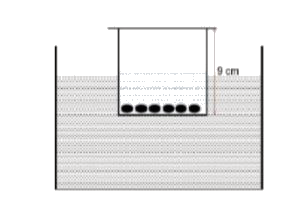A gas at initial temperature T undergoes sudden expansion from volume V to 2V. Then -
The process is adiabatic
The process is isothermal
The work done in this process is nRT lne(2) where n is the number of moles of the gas.
The entropy in the process does not change
The correct Answer is:A
Step by step video, text & image solution for A gas at initial temperature T undergoes sudden expansion from volume V to 2V. Then - by Physics experts to help you in doubts & scoring excellent marks in Class 12 exams.
Updated on:21/07/2023Topper's Solved these Questions
Similar Questions
A wide bottom cylindrical massless plastic container of height 9 cm has 40 identical coins inside it and is floating on water with 3 cm inside the water. If we start putting more of such coins on its lid. It is observed that after N coins are put, its equilibrium changes from stable to unstable. Equilibrium in floating is stable if the geometric center of the submerged portion is above the center of mass of the object) The value of N is closed to

View SolutionDuring an experiment, an ideal gas is found to obey an additional law pV^(2) =constant. The gas is initially at a temperature T and volume V. Find the temperature when it expands to a volume 2V.
View SolutionDuring an experiment, an ideal gas is found to obey an additional law p/V2= constant. The gas is initially at a temperature T and volume V. Find the temperature when it expands to a volume 2V.
View Solutionएक आदर्श गैस pV2 = नियतांक, नियम का पालन करती है | गैस का प्रारम्भिक ताप व आयतन क्रमशः T व V है | यदि गैस का आयतन बढ़कर 2V हो जाता है, तो ताप कितना होगा ?
View SolutionDuring an experiment an ideal gas is found to obey an additional law V2P = constant. The gas is initially at temperature T and volume V. When it expands to a volume 2V, the temperature becomes :
View SolutionDuring experiment an ideal gas is found to obey an additional law VP^(2)= constant. The gas is initially at temperature T and volume V, when it expands to volume 2V, the resulting temperature is
View SolutionThe temperature of an ideal gas undergoing adiabatic expansion varies with volume as T prop V^(-(3)/(4)) , then the value of (C_(P))/(C_(V)) for the gas is
View SolutionAn ideal gas is found to obey a gas law, Vp^2 = constant .Initial temperature and volume of the gas are T and V respectively. IF the gas expands to a volume 2V, what will be the effect on temperature?
View SolutionDuring an experiment an ideal gas is found to obey an additional law VP2= constant. The gas is initially at temperature T and Volume V. Find the resulting temperature when it expands to volume 2V.
View SolutionAn ideal gas pV^2 = Constant, follows the rule. The initial temperature and volume of the gas are T and V respectively. If the volume of the gas increases to 2V, what will be the temperature?
View SolutionDuring an experiment, an ideal gas is found to obey an additional law pV2=constant. The gas is initially at a temperature T and volume V. Find the temperature when it expands to a volume 2V.
View SolutionDuring an experiment an ideal gas is found to obey an additional law VP^2= constant. The gas is initially at a temperature 'T' and volume 'V'. When it expands to a volume 2V, the temperature becomes
View SolutionDuring an experiment an ideal gas is found to obey an additional law VP2= constant. The gas is initially at a temperature 'T' and volume 'V'. When it expands to a volume 2V, the temperature becomes
View SolutionDuring an experiment, an ideal gas is found to obey an additional law VP2=constant, The gas is initially at a temperature T, and volume V. When it expands to a volume 2V, the temperature becomes…….
View SolutionThe temperature of an ideal gas undergoing adiabatic expansion varies with volume as T∝V−34, then the value of CPCV for the gas is
View Solution

